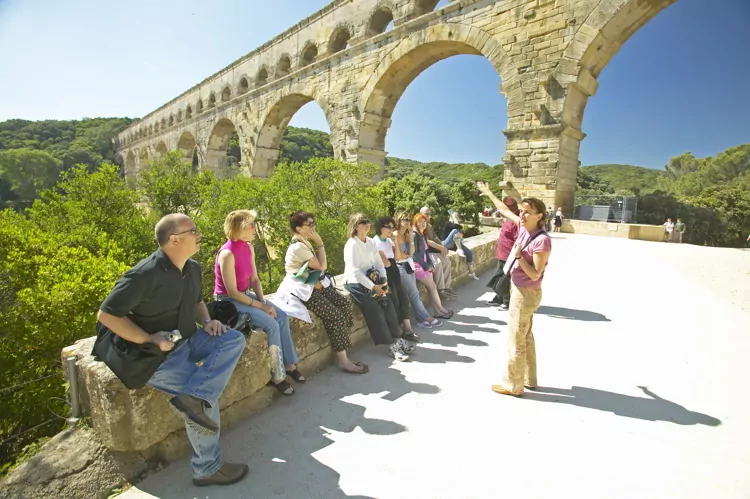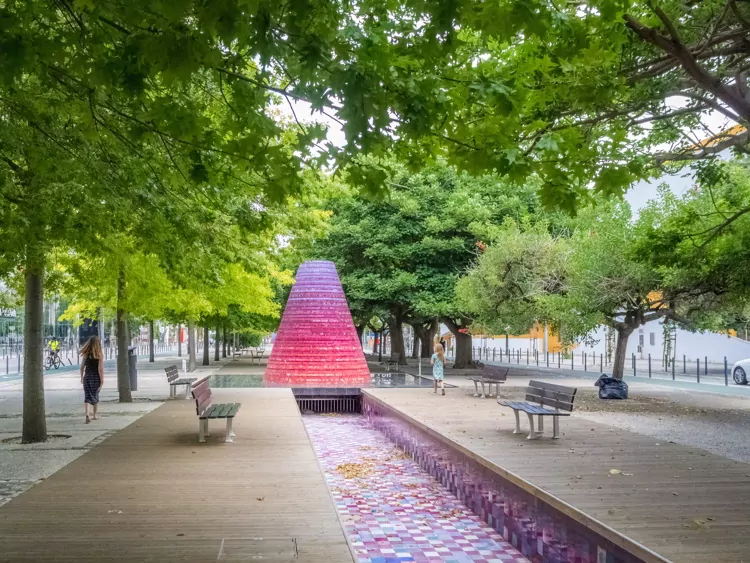After living for six years in Punta del Este, Uruguay, I swore to myself that I’d never, ever live in a tourist area again.
Never.
And that includes places with large numbers of expats, which can have the same impact as large numbers of tourists on an area.
However, after making that declaration, I have since bought two more properties in high-tourism areas…
That’s because there are really two sides to that coin. Living in a popular tourist destination can be annoying… but it also has its advantages.
Things That Really Annoyed Me About Living In A High-Tourism Area

Tour guides can be an annoyance of living in a tourist area
1. Lack Of Community:
Touristic areas just don’t have the same community feel as a normal residential setting. Since many of us stand out as foreigners when living abroad—and tourist destinations have high numbers of foreigners—you often feel like you’re being treated as a tourist rather than a local resident who is part of the community.
2. It’s Hard To Integrate:
In touristic areas it can be hard to integrate with the local culture and people because the local residents often place you in the “tourist” camp (or expat camp) rather than the local camp.
3. Higher Costs And Gringo Pricing:
As an expat living in a tourist area, it’s hard to exempt yourself from the pricing practices that tourists usually fall victim to.
4. The Disneyland Effect:
Popular touristic areas anywhere in the world often don’t reflect the country or region’s genuine character. Instead you get a caricature of the country, one designed to attract visitors.
5. Tourist Annoyances:
High-tourism areas often come with annoyances, such as a constant stream of vendors, tour guides, scammers, and even beggars. When I lived in Montevideo’s Centro neighborhood, I watched from my balcony as the town’s pickpockets, thieves, and beggars passed uneventfully through Centro on their way to Ciudad Vieja to prey on its wealth of tourists and cruise-ship passengers.
There may also be issues with crowds themselves, bringing noise and traffic, or taking up valuable space in your favorite parking lot or restaurant.
There’s no doubt that these things can be bothersome. But high-tourism areas also have benefits… benefits that you’ll appreciate.
These Advantages Of Touristic Areas May Outweigh The Annoyances

Tourist areas often have great infrastructure
1. The Community Amenities:
Touristic areas usually have more than their fair share of nice restaurants, cafés, and entertainment. When I first moved to Vilcabamba, Ecuador, we had 16 restaurants listed in the guidebook, in a village of about 500 people. This is far more than you’d see in a normal Ecuadorian mountain village.
2. Care Of Infrastructure:
Tourist destinations usually have excellently maintained roads, sidewalks, trails, and beaches. In Mazatlán, Mexico, there are crews who clean the boardwalk streets and beaches every morning. In Punta del Este, Uruguay, platoons of young people rake the beach each day while looking for stray items of litter.
By contrast, I once lived on a “local” beach in Brazil where the plastic bottles and trash stayed put until the homeowners got out there to clean them up.
3. Lack Of Obvious Poverty:
Obvious poverty can be a downside in poor countries, but in tourist areas you’ll often see far less of it. One reason is that these areas bring local jobs… the other is that local officials often make efforts to keep panhandlers and homeless people away from the high-tourist sectors.
4. Better Flight Connections:
Areas with high tourist traffic usually have convenient ways to get there, such as international airports with frequent flights or good public transportation.
5. Rental Income And Resale:
Many tourist areas offer the opportunity for good rental returns due to the high demands for short-term stays. They can also provide you with more liquidity at resale time.
6. More English Spoken:
English is the primary international language and is almost always used in tourist destinations. So if it’s the only language you speak, you’ll generally be better off in an area with lots of tourists or expats.
7. More Conveniences:
I’m talking about things like ATMs and bank branches as well as North American franchise stores and North American products. In areas with lots of tourists passing through, these conveniences are plentiful, making life abroad much easier.
8. Better Construction Options:
High-tourism or expat areas often bring better options for housing than the local market would otherwise demand. You’ll find more high-end condos, for example, built to first-world standards in areas with high levels of tourism.
This can cut both ways. Sometimes high-tourist areas bring mass-market, low-end, bargain construction that results in poor quality housing.
9. Finally, Great Local Intrinsic Attributes:
Tourists usually don’t come just to hang out with other tourists… they come because the area has something good to offer. This can include beautiful beaches, sublime weather, scenic mountains, or quaint old cities.
Whatever brought the tourists in the first place is something that you probably will enjoy, too.
A High Concentration Of Expats May Produce The Same Effect As Tourists
When I first moved to Cuenca, Ecuador, in 2001, there was maybe one restaurant in town that qualified as fine dining. Litter was a problem in the historic center and many of the streets and sidewalks were in poor repair. Locals didn’t speak English, Spanish was mandatory… it was six months before I met my first English-speaker in Cuenca.
Today, Cuenca has between 8,000 to 10,000 North-American retirees.
This influx has brought some disadvantages: a lack of integration with the local community and higher prices all-round. The local culture is changed, likely forever.
But it’s also brought positives: dozens of creative and elegant dining options, cafés, ethnic food, a more diverse supermarket stock, and a cleaner, better maintained downtown.
You will also find far more English spoken, plenty of modern condos on the edge of town, and even a local immigration office.
Ultimately, a large expat community affects the local environment in many of the same ways that tourism does, bringing both the bad and the good.
Consider The Tourism Angle Carefully When Buying Abroad
Be honest with yourself about whether you’ll be using your overseas home full-time, for part of the year, or as a vacation getaway. In my experience, the more you’re in residence, the less you’ll like the tourist environment.
If you’re spending one month at a time abroad, you’ll enjoy the tourist areas’ amenities, and the annoyances won’t have time to wear on you. Long-term residents, however, will appreciate the community feel and local culture of non-touristic areas, long after the novelty of the tourist amenities have worn off.
Medellín, Colombia, is a rare find where I enjoy all the amenities of a tourist destination without the tourists or annoyances that come with a busy tourist trail. I can go weeks without seeing another American while still enjoying a convenient, upscale lifestyle at a low cost.
But aside from isolated examples like Medellín, you should give this issue careful thought when buying a second home abroad. Buying in a popular tourist destination will bring you some much appreciated amenities, but they do come with a price.
Lee Harrison
Latin America Correspondent
***
Letters To The Editor
Hi,
Thanks for your information about Colombia. I used to live in Cali and I’m interested in returning now that things are politically calm.
I would like to know if it’s worth the time and money to ship my things, like my bed and a small amount of furniture. I don’t even know where to start in that regard.
Thanks,
Marita
An excellent question—and one that comes up frequently. I’ll start by saying that I’ve moved a household internationally three times and had a good experience each time. Each year the process for booking an international move gets easier. A number of sites will even put your move out for bids, after which you’ll get competing prices via email. Take a look here for two that I’ve used in the past month:
- International Movers
- Worldwide Moving
However, I would not consider moving furniture to Colombia. At today’s exchange rates, high-quality, Colombian-made furniture is a real bargain, and there’s no way you’ll save money by moving a few items. You can buy brand-new furniture in Cali for thousands less.
For more information, check out this report on buying and living in Cali, Colombia.

